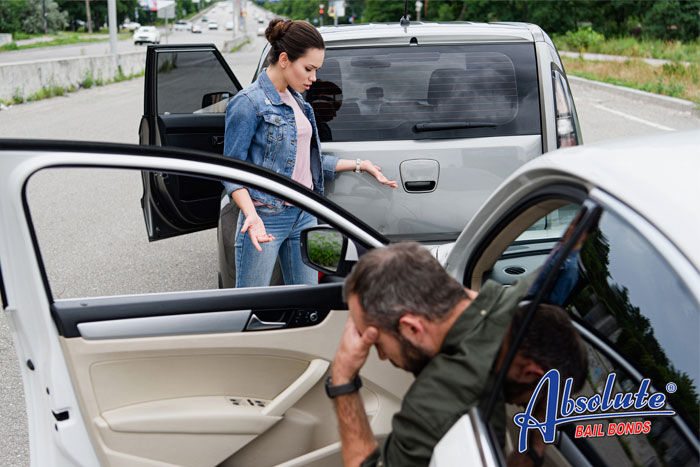
Absolute Bail Bonds “We Never Sleep”
At Absolute Bail Bonds we make paying for a bail bond easy for our clients. We offer payment plans, 0% interest bail bonds, and personalized payment plans for qualified clients. We will never surprise you with hidden fees like our competitors because we believe in working with honesty and integrity.
- 24/7 Bail Bond Service
- 20% Discount
- Phone approvals
- 0% Interest Payment Plans
- No Hidden Fees – Unlike other bail agencies
- No Collateral with Working Signer
- Se Habla Español
You don’t have to worry when your friend or family member has been arrested. You can count on Absolute Bail Bonds in Los Angeles our bail agents are ready to assist you. Night or day, anywhere in California, we can help you bail out your loved one. Our skilled bail agents will always be available to offer their assistance.
What we do is help people in your situation post bail so they do not have to await their hearing in jail. Our process is simple:
1. Let us know who you need to bail out, their birthday if you know it, and where they are being held. Absolute Bail Bonds will contact that location and gather the rest of the information we need.
2. Tell us your financial situation and will work around it to formulate a customized payment plan with low monthly rates.
3. Review and sign paperwork so you understand what you are paying and the steps you need to take to ensure the bond is accepted (ie making sure the arrested individual appears in court when ordered).
4. Our agents will send paperwork to the location your loved one is at. The paperwork will be processed there and your loved one will be released.
It’s really as simple as that but once we start discussing your situation, we’re sure you’ll have more questions so do not hesitate to ask! For a free consultation simply call 1-800-793-2245.

You Can Count on Absolute Bail Bonds
At some point, you may need to hire a bail bondsman. As much as you don’t want to admit that you think your loved one going to get arrested someday, you know it’s very likely. So, you want to be as prepared as possible.
A bail bondsman will issue a bail bond for your loved one so that he or she can be released from jail. The bail bondsman will charge a 10% premium (like a fee for their services) which is 10% of the full bail amount. You will be allowed to pay off the premium over a set period of weeks or months, whatever you and the bail bondsman agree to. You will need to make sure your loved one shows up for court.
Absolute Bail Bonds in Los Angeles can go into deeper detail when you’re ready to talk one-on-one and get the bail bond processed or if you just want a consultation, free of charge. We can be reached online or on the phone at 1-800-793-2245.

Distracted Walking in California
Everyone is familiar with distracted driving, but few of us have ever heard of distracted walking laws. If you’re wondering if that’s even a real thing you’re not alone.
Rest assured, not only is distracted walking a viable concern, but one California city, Montclair, has already passed a distracted walking law. In April 2018, the city’s distracted walking law officially went into effect. Once that happened, anyone caught using their cell phone while walking across the street was subjected to a $100.
It seems like a silly rule, but if you take a few minutes watching people walking on the sidewalk and you can see why distracted walking is a concern. These days, people are completely glued to their phones and often unaware of what is happening around them. Some don’t even look up when they start crossing the street. This type of behavior has prompted more cities to explore the concept of distracted walking laws.
A team of researchers at Rutgers New Jersey Medical School, Newark revealed that the number of medical emergencies that included head and neck injuries has substantially increased in the past 20 years.
Legally, drivers are supposed to be aware of pedestrians and do everything in their power to avoid hitting them with their vehicle. The problem that arises is how are drivers supposed to predict when a pedestrian who is texting will suddenly step into the path of oncoming traffic. What makes the issue even more challenging is that many of these pedestrians don’t even realize that they are now in the middle of the road and don’t behave rationally.
Do you think more cities should have distracted walking laws? If distracted laws became common and patrol cops started issuing tickets and fines, would you be more inclined to leave your phone in your pocket, or would you continue to talk and text?

Off-roading in California’s State and National Parks
Off-roading isn’t just a lot of fun, it’s also a great way to see parts of California’s state and national parks you wouldn’t otherwise, get to see. Off-roading provides you with the means to visit more remote areas than the traditional roads take you to, while also allowing you to cover more ground than you would if you were hiking or biking.
While there are many benefits connected to off-roading through California’s state and national parks, going off-road also means you have some additional responsibilities you must adhere to.
Make Sure Your Permit is Current
You’re not allowed to hop into your ATV and start tooling around California’s state and national parks. The only people who are allowed to enjoy off-road adventures are those who have the proper permits.
If you’re going on an off-road adventure in one of California’s state parks, you need to fill out an application with California’s Department of Parks and Recreation. The vehicle you are using must comply with current state environmental codes, and your off-highway vehicle permit must be kept current. The OHV permit is $25 if you’re purchasing a season-long pass. You only have to pay $5 for a day pass.
If you’re not a California resident, you still have to purchase an OHV permit before you can embark on an off-road adventure through the truly stunning state parks. The cost of the permit for non-residents is $30.
Off-Roading in National Parks
Some people make the mistake of thinking that because they got an OHV permit from the state, that they can also go off-roading in California’s national parks. That’s not the case. The National Park Service manages the National Parks and has its own permit. You’ll have to contact the National Park Service to learn about the application process and cost of the off-road permit.
Follow the Rules
Don’t assume that your off-road permit allows you to go anywhere and do whatever you want. That’s not the case at all. The National Park Service in particular is diligent about enforcing rules that pertain to what you can and can’t do while off-roading. Breaking one of the rules could end up costing you a lot of money.
If you’re going off-roading it’s important to find out exactly where you can and can’t go. Most parks have maps and even post the areas where you’re not allowed to take your off-road vehicle.
Simply getting caught off-roading in a section of a National Park, where off-roading is prohibited, is considered a violation of Title 36 of the Code of Federal Regulations. If you’re convicted of the violation, you could be sentenced to as much as 6 months in prison and also fined $5,000. Additional charges that are often added to this violation include violating an endangered
species, littering, wildlife, plants, and natural or cultural features violations, and damaging archeological resources.
Have fun on all of your off-road adventures this summer!

California Stalking Laws
In California, you can be convicted of stalking even if you have never engaged in actively pursuing a victim as they went about their daily activities. It’s even possible to be found guilty of California’s stalking laws if you’ve never had a face-to-face encounter with the victim. The reason for this is because California lawmakers have written the state’s stalking laws in such a way that they encompass a variety of acts that include harassment, even if that harassment only takes place in the form of letters, social media posts, or phone calls.
The issue of stalking in California is addressed in Penal Code 646.9 PC. The laws states, “Any person who willfully, maliciously, and repeatedly follows or willfully and maliciously harasses another person and who makes a credible threat with the intent to place that person in reasonable fear for his or her safety, or the safety of his or her immediate family is guilty of the crime of stalking.”
The interesting thing about California’s stalking laws is that contacting someone via social media posts, making phone calls, and following them around isn’t always considered stalking. While these things may result in a police report getting filed, to convict you of stalking, the prosecution must prove that your actions/words threatened the victim so that they feared for either their life or their safety.
One of the interesting things about California’s stalking laws is that they are wobbler offenses. That means you could be charged with misdemeanor or felony stalking. There have even been instances where a person was charged with both misdemeanor and felony stalking. The bulk of stalking convictions in California are misdemeanors.
If you’re convicted of one count of misdemeanor stalking in California, the judge can sentence you to a full year in county jail, fine you up to $1,000, and misdemeanor probation. If convicted of felony stalking, your sentence can include up to five years in a state prison, felony probation, and a fine.
While stalking charges involve threatening a victim, if that victim is hurt as a result of your actions, you’ll likely be charged with assault and intimidation in addition to stalking.
Criminal charges could represent one of the problems you face following a California stalking case. Many stalking victims also decide to file a civil case against their stalker. The purpose of the civil case is to gain financial compensation for the mental anguish they suffered as a result of the stalking episode.

What is Felony Stalking
While everyone knows that stalking is a crime, few realize that it can be a felony or a misdemeanor and in some cases, the accused might be charged with both a felony and a misdemeanor.
Every single state has stalking laws. While the nuances of stalking laws vary from one state to another, for the most part, each state has the same description of what can be considered stalking. As a rule, any behavior that can be considered prolonged harassment, an obvious attempt to frighten someone, the unwanted monitoring of a person, using proximity to threaten a person, or actions that lead to emotional distress is covered by stalking laws.
Anyone who engages in the following types of behavior will likely be charged and convicted of stalking in California:
- Going out of your way to follow a person
- Frequently showing up at locations where you know a specific person will be
- Using GPS to monitor a person’s movements
- Constantly filming/photographing someone without their permission
- Obsessively monitoring someone’s social media accounts, phone calls/texts, reading their emails, and studying their computer activities
- Going out of your way to gather as much information as you can about a specific person
- Leveling threats against a person or their loved ones (including pets) if they don’t spend time with you
- Instigating property damage
- Sending gifts and other forms of communication after you’ve been told to stop doing so
While it’s true that it can sometimes be difficult to determine when stalking crosses the line from a misdemeanor and becomes a felony, the general rule of thumb is that anything that seems more intense than simple harassment will likely be considered a case of felony stalking.
The exact punishment a person receives following a stalking conviction in California often varies from one case to the next. When handing down a sentence, the judge looks at a variety of factors, including:
- Your criminal history
- The type/intensity of the stalking episodes
- If the victim had a POP order that you ignored
- If anyone was hurt because of your actions
The sentence for a misdemeanor conviction can include spending a maximum of one year in county jail and being required to pay a fine that doesn’t exceed $1,000. In most cases, you’ll also be told that you’re legally required to stay away from your victim and that you’re also not allowed to contact them.
The sentence for a felony stalking conviction in California can include spending three years in state prison. If you have prior stalking convictions on your record, you could be sentenced to five years in prison.

Documenting a Car Accident
If you haven’t been in a car accident yet, you should consider yourself lucky. Considering how much time we spend behind the wheel, the odds are good that sooner or later you’ll be involved in one. Because of the likelihood of getting into a car accident, it’s important to know what the proper protocol is during an accident.
The first thing you need to do is make sure neither you nor anyone else is hurt. If there are injuries, call for medical help and do as much first aid as possible. During this, you should also contact the police.
When there are injuries, dealing with those should always be your first priority. Let the police handle writing up the details of the accident.
If there aren’t any injuries, you should still call the police, but while you’re waiting for them to arrive on the scene, take some time to create your own documentation of the accident. Thanks to the installed camera inside your smartphone this is easier than ever. All you have to do is whip it out and start snapping photos.
Having clear accident scene photos is extremely important. Unlike a police report that can be dismissed by a judge as hearsay, the photos you snap at the accident can be used during a civil trial. Your insurance company might even use them as they try to determine how the accident happened and who is at fault. The photos also help provide proof of who actually witnessed the accident.
When you’re snapping photos, you’ll want to take pictures of both vehicles, anyone who is standing nearby, and the local landscape. Make sure you include shots of road signs, objects that could have helped cause the accidents, intersections, and traffic lights.
As soon as you can, sit down and write your own account of what happened in the moments leading up to the car accident. You should do this even if you believe the accident was your fault. Once you’ve completed writing your own report, save it and the photos you snapped somewhere safe. It’s really in your best interest to store copies in multiple places, such as one set in a cloud storage unit, a few more saved to various email locations, and maybe a hard copy in your filing cabinet.
You need to keep the photos and your account of the accident for a full two years. After two years, California’s statute of limitations for car accidents kicks in and you’ll no longer have to worry about a civil lawsuit.

Crimes of Passion
There is something about the term “crime of passion” that causes many of us to think about romance and true love. The reality is that crimes of passion are not about showering a loved one with flowers and chocolate. Victims of crimes of passion will tell you that they are actually terrifying, life-altering acts that have more to do with fear than love.
What are Crimes of Passion
The legal definition of a crime of passion is, “a defendant’s excuse for committing a crime due to sudden anger or heartbreak, to eliminate the element of premeditation.”
A suspect is never charged with a crime of passion. That phrase is primarily used by the media and defense attorneys. In most cases, people who have committed “crimes of passion” are actually charged with murder, assault, or sexual assault.
Why so Many Use the Crime of Passion Defense
There are two reasons so many people use the crime of passion excuse. The first is to eliminate the idea that the crime was premeditated. If the prosecutor is convinced that the crime was premeditated and they feel they can prove it in court, the charges, and resulting penalties, will be far more severe than if you are found guilty of acting in the heat of the moment.
For example, for the prosecution to pursue a case of premeditated murder, the lawyer has to prove the suspect didn’t just think about murdering the victim, but actively planned out the details. Failing to prove this could cost the prosecutor the case.
Another reason defense attorneys like to use the phrase “crime of passion” while defending a suspect is because it’s a great way to convince the jury to put themselves in the accused shoes. The lawyer is basically asking each jury member to put themselves in the suspect’s shoes and imagine how they would feel if they were in the same situation. In some situations this can sway the jury, causing them to find the defendant not guilty.
It’s worth noting that California has an interesting take on crimes of passion that result in murder. In California, the defense not only has to prove that the murder was a crime of passion, but they also have to prove that the defendant was experiencing emotional turmoil at the time. The way the law is written makes it difficult for an attorney to use the crime of passion defense in cases that involve revenge.

Driving on a Suspended License in California
Several California drivers have found that they didn’t fully appreciate how much independence they enjoyed as a result of their driver’s license until the state suspended that license, making it impossible for the person to drive themselves.
Why California Driver’s Licenses Are Suspended
There are a variety of reasons your California driver’s license could be suspended. The most common cause for suspensions is a DUI conviction. Unpaid tickets, severe driving infractions, and simply accumulating too many bad driving points can also result in a suspension. There are even cases where California driver’s licenses have been suspended for non-driving offenses, the most common of which is unpaid child support.
What a Suspended California Driver’s License Means
If your license has been suspended it means you can’t drive, for any reason, until you’re able to get the license reinstated. In some cases, such as drunk driving and reckless driving, the suspension has a time limit, such as 6 months. In other cases, it remains suspended until you correct whatever issue triggered the suspension. For example, if it was suspended because you didn’t pay child support, it will remain suspended until you’ve gotten caught up on what you owe.
Driving on a Suspended California Driver’s License
California’s Vehicle Code #14601.1 deals with the issue of anyone who is caught driving on a suspended license in California. It states, “(a) No person shall drive a motor vehicle when his or her driving privilege is suspended or revoked for any reason other than those listed in Section 14601, 14601.2, or 14601.5, if the person so driving has knowledge of the suspension or revocation. Knowledge shall be conclusively presumed if mailed notice has been given by the department to the person pursuant to Section 13106. The presumption established by this subdivision is a presumption affecting the burden of proof.”
The penalties that can be connected to driving on a suspended driver’s license in California include:
- Having to spend time in jail
- Substantial fines
- Probation
- Additional costs for any additional traffic violations that were committed while you drove with a suspended license
If your California driver’s license is suspended and you can’t fathom how you’ll get by without it, there’s a chance you can appeal to the court and get what California calls a hardship license. This type of license is a heavily regulated one that limits where you can drive and even what times you can drive. If you’re caught driving at a time or for a purpose that doesn’t align with the limits, you’ll be charged with driving on a suspended license.

What is Statutory Rape? Statutory Rape Laws and Charges
Teenagers are full of two things. Hormones and emotions. The combination causes them to make questionable life choices, which includes engaging in sex. When parents learn that their teenage child has become sexually active they often find themselves worrying if their child can be charged with statutory rape.
Recent changes to California’s laws about sex with minors have made the issue even more confusing than it is in some other states.
What is Statutory Rape?
Strictly speaking, statutory rape has nothing to do about sexual consent. In statutory rape cases, both parties are usually willing. These cases aren’t about the willingness of both partners but whether they’re able to cope with the emotional and physical ramifications that go hand in hand with a sexual relationship.
According to the law, statutory rape takes place when someone has sex with a minor, who is otherwise referred to as a person who hasn’t reached the age of consent.
Is it Possible for a Minor to be Charged with Statutory Rape?
The question of whether it’s possible for two minors to be accused of statutory rape doesn’t have a clear legal answer.
According to California Penal Code Section 261.5, statutory rape takes place whenever someone has sex with someone who hasn’t reached their eighteenth birthday. According to that, if a sixteen-year-old couple decides to have sex, both of them can be charged with statutory rape.
The problem is that for the charges to stick, the court has to determine which member of the couple is the victim and which is the aggressor, something that’s nearly impossible to do when both are minors. Due to the legal complexities of the situation, the charges are usually dropped and the court lets the parents decide how to handle the matter.
Penalties for Statutory Rape in California
Statutory rape charges in California are a serious matter. Statutory rape is one of the state’s many famous wobbler offenses. No two cases are handled the same way, which can make it difficult to guess what the final results will be. The most extreme cases can result in a sentence that includes 3 years in jail as well as a $10,000 fine.
Sometimes the court requires that the defendant register as a sex offender, but there are also situations where that hasn’t happened. It largely depends on the age of the two people involved in the case as well as the type of relationship they’re engaged in.

